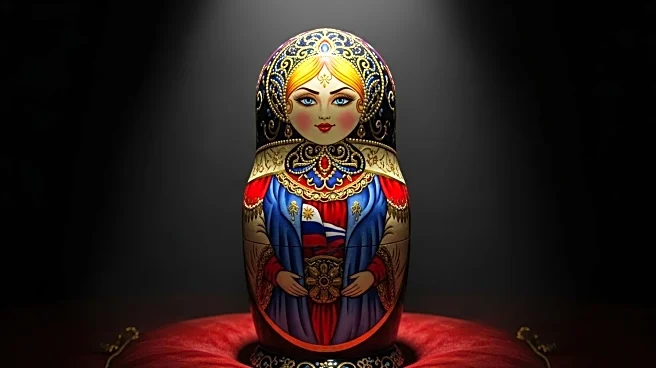What is the story about?
What's Happening?
The film 'The Wizard of the Kremlin,' directed by Olivier Assayas, has premiered at the Venice Film Festival, featuring Jude Law as Russian President Vladimir Putin. The drama, adapted from Giuliano da Empoli's novel, explores the rise of Putin's Russia post-USSR dissolution. Law's portrayal of Putin is notably mild-mannered, contrasting with his previous roles as more aggressive leaders. The film centers on Vadim Baranov, played by Paul Dano, a fictional character inspired by Vladislav Surkov, a real-life advisor to Putin. Baranov's journey from aspiring actor to influential television executive is depicted, highlighting his role in shaping political narratives during Boris Yeltsin's re-election campaign.
Why It's Important?
The film offers a unique perspective on the political dynamics that led to Putin's rise to power, providing insights into the manipulation of media and public perception in Russian politics. By focusing on the strategist behind the scenes rather than Putin himself, the film sheds light on the complexities of political influence and the role of media in governance. This portrayal may influence public understanding of Russian political history and the factors contributing to Putin's sustained leadership, potentially affecting international perceptions of Russia.
What's Next?
The film's release may spark discussions and analyses among political commentators and historians regarding the accuracy and implications of its portrayal of Russian politics. It could also lead to further cinematic explorations of political figures and events, influencing how historical narratives are presented in media. Audiences and critics may debate the film's interpretation of Putin's character and the broader political context, potentially impacting its reception and influence.
Beyond the Headlines
The film raises questions about the ethical implications of media manipulation in politics, highlighting the power of appearances over reality. It may prompt viewers to consider the role of media executives and strategists in shaping political landscapes, both in Russia and globally. The cultural portrayal of political figures in cinema can influence public perception and understanding, potentially affecting political discourse and engagement.

















